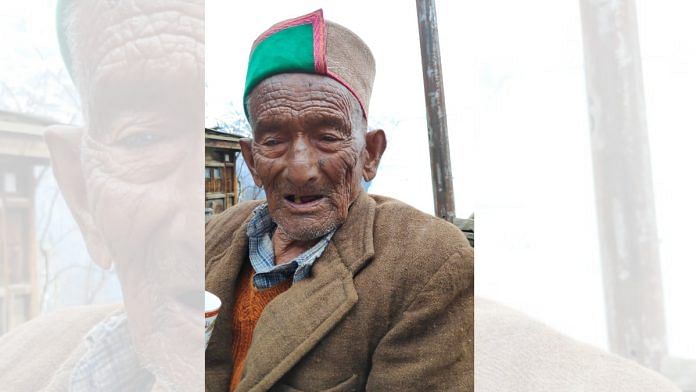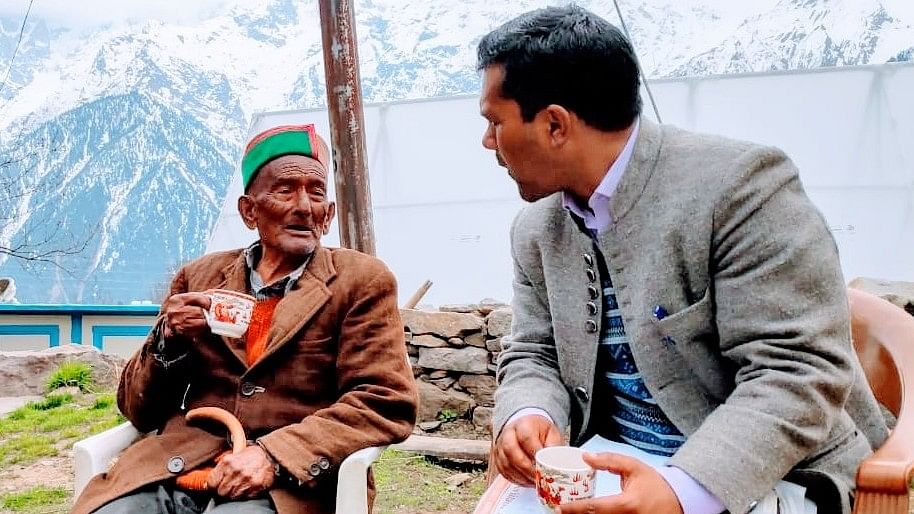
Kalpa Village: The first time Shyam Saran Negi voted, Prime Minister Narendra Modi was a year old, Congress president Rahul Gandhi’s parents Rajiv and Sonia Gandhi were children of seven and five years old, respectively, and the Bharatiya Janata Party (BJP) was 29 years from existence.
The first time Shyam Saran Negi of Himachal Pradesh voted was also the first time Independent India voted, and this centenarian remains an enthusiastic cheerleader for voting to this day.
Talking to ThePrint as India votes for its 17th Lok Sabha, 67 years after that first election in 1952, Negi, 102, says he is sure this will be the last time he votes.
All of Himachal Pradesh’s four seats vote in the seventh and last phase of the Lok Sabha elections, on 19 May.
Seated at his home in Kalpa valley, Negi stretches out his wrinkled fingers to count the days left till voting day.
“I will vote one last time,” he tells ThePrint, and laughs, adding that it is his “duty to vote and strengthen the democratic spirit”.
“Aaj tak maine apna vote barbaad nahi kiya. Ab toh last time hai life ka. Vote daalne jaroor jaunga (I have never wasted my vote. Now in the last days of life, I will definitely go to vote),” he says.
“Mera vote Bharat ko majbooti dega aur navyuvokon ko prerna (My vote will give India strength and inspire youths),” Negi adds.
If people of his age can vote, he says, nothing should stop the young.
“Old age is not easy, especially in high-altitude areas like Kalpa, where the winter temperature hits -14°C to -15°C degrees,” Negi adds. “And my health has also deteriorated. Time is running out for me.
“If an old man, whose legs don’t support him anymore, can go and vote, why can’t young voters?” he asks. “I am sure it can’t be without positive impact.”

That first vote
It was a mix of chance and call of duty that landed Negi, a retired school teacher, his unique place in Indian history.
“Mujhe pura yaad hai,” Negi says, but recalls just about it all.
After Independence in 1947, India’s first election was scheduled for February 1952.
However, the Election Commission realised that Kinnaur district, where Kalpa falls, couldn’t vote at the time as it experiences heavy snowfall from November to March. Polling in the district was thus advanced to 25 October 1951.
At the time, Negi was posted at Moorang, a village eight to 10 km from Kalpa, and was one of the teachers recruited for polling duty.
“That day, I had two jobs at hand,” he tells ThePrint. “My poll duty was at Moorang polling booth but I was a voter at Kalpa polling booth. I came home the night before, got up early, and went to the polling booth around 6 am,” he recollects.
“The polling party had not arrived by then,” he adds. Negi then sat there in wait. When the polling party arrived, he says, he requested them to allow him to cast his vote so he could leave for his polling duty at Moorang.
“They somehow agreed to allow me to cast my vote at 6.30 am — half-an-hour before polling was to start,” he adds. “That made me Independent India’s first voter. Did it not?”
Also read: BJP & Congress are forgetting city voters in race to woo villages
Coming into the spotlight
Born on 1 July 1917, Negi is among the Election Commission’s ambassadors for voting.
It wasn’t until 2007 that he was recognised as Independent India’s first voter, when the Election Commission (EC) undertook an expansive exercise to identify iconic voters, especially those who had voted in the first parliamentary election.
As officials trawled through the records, Negi’s name cropped up. He had voted in the 1952 general election, and hadn’t missed any of the polls since, be they parliamentary, assembly or panchayat.
Since identified as an ambassador for the power of the vote, Negi has taken on the role with enthusiasm. In 2010, he was honoured by then chief election commissioner Navin Chawla.
Four years later, before the 2014 Lok Sabha elections, Negi was one of the icons chosen by Google for its “Pledge to Vote” series. The short film starring Negi went viral, surpassing the footprints recorded by the one featuring other ambassadors, including superstar Amitabh Bachchan.
‘Give Modi time’
There have been countless elections in the six decades since. Has Negi, from his vantage point, seen them strengthen democracy?
Negi takes a long pause before answering the question. “Kuch to farq jaroor pada hai, lekin jaisa hona tha waisa nai (It certainly has, but not as much as it should have),” he replies.
He is agitated by the continued poverty and hunger in India despite the country’s development, and lays the blame on the Congress’ door.
Prime Minister Narendra Modi, he says, can make some difference if he gets more time.
“The Congress ruled the country for years and should take blame for corruption, farm distress, poverty and hunger,” he says. “Had the Congress delivered on its promises and governance, why would the people have rejected it and embraced other parties like the BJP?”
He also rejects the controversy over electronic voting machines (EVMs), which the opposition has often alleged are open to manipulation.
“EVMs are good,” he says. “One can see a candidate’s photo before pressing the button. A beep sound confirms that the vote has been caste,” he adds, “Other systems and ballot papers had problems.”
‘Have to stay neutral’
Negi’s popularity has turned Kalpa into a tourist destination, with visitors to this remote corner of Himachal Pradesh making it a point to see him and get a picture with him.
“During election time, we are visited by journalists, and government and election staff. My grandfather feels happy and never hesitates to speak his mind freely,” says Deepak Negi, his grandson. “He is a great supporter of Modi. He listens to his Mann ki Baat (the PM’s radio show).”
However, while Negi may like Modi, he is loath to have his name used for partisan purposes. A month ago, when a BJP supporter prefixed “chowkidar” to Negi’s name, in keeping with PM Modi’s recent campaign thrust, and used it on social media, the centenarian was not pleased. He approached Kinnaur deputy commissioner Gopal Chand, and the BJP supporter was forced to tender an apology and delete the post.
“Why should anyone misuse my name? Being an iconic figure, I have to stay neutral. I want India to be a stronger and prosperous nation,” he says.
“Don’t know if I will be alive for future polls,” he adds, looking outside his window as the sun sets on snow-covered mountain peaks.
As he signs off, he has one request to Indian voters: “Don’t vote on trivial issues,” he says, “The democracy is hard-earned and it’s our duty to protect it.”
Also read: What matters more to Indian voters in elections: campaign slogans or party manifestos?

I wish I could share Mr. Shyam Sharan Negi’s optimism about India and it’s democracy. He is from a different era, a kinder and gentler time, when the republic was young, an age of innocence and ideals meant something.
I don’t have to say anything more.
मतदान और कन्या दान खानदान देखने के बाद करना…
— कुछ अंश जशोदा बेन की डायरी में से..
जर्मनी में हिटलर जब कमजोर होने लगा था तब उसने पूरे देश को युध्द मे झोंक दिया था।देश की जनता सावधान हो जाये।
પત્નીની રક્ષા જવાબદારીથી ભાગી અંબાણી/અદાણીની ચોકીદારી શરૂ કરી…સાથે સાથે લલલત, નીરવ વગેરે કે જેમણે લોકોનૉ અને સરકારી સંસ્થાઓ ન કરી નાખ્ તેમને આંખ આડા કાન કરી દેશ બહાર જવા દીધા…૨ કરોડ નોકરીઓ ઊભી કરવામાં સદંતર નનષ્ફળ જવાથી ભણેલા ગ્રજ્્એટસન નળી નાખી (ક્યા??) ચ્હા અને ભજીયાની લારી શરૂ કરવાની સલાહ આપવાન કહ્ય…ખેડતો પાસેથી જમીન પડાવી, ઔદ્યોલગકરણના નામે દેવાલળયા છતા જાણીતા અને માનીતા એવા અંબાણી/ અદાણીને મફતના ભાવે જમીન આપી…ઉધ્યોગો તો ના સ્થપાયા, રોજગાર પણ ના વધ્યા…. તેના માલલકો કરોડો રૂનપયા કમાઈ લીધાાંાં અને ખડતો પાયમાલ થઈ ગયા…ઓછા પાકથી શાક -ભાજી, અનાજ- કઠોળ ના ભાવ આસમાન પહોપહોંચ્ય. મેડીકલ ઇન્સયોરન્સના નામે ખાનગી દવાખાના અને હોસ્સ્પટલોની સંખયા વધી પણ ઉપચાર મોંઘા થયા, દવાદારૂ ના ભાવો સામાન્ય માણસની પહોંચની બહાર થાંઈ ગયા…નશક્ષણમાં ખાનગી કરણ લાવતા નશક્ષણ ખાડે ગ્…મા-બાપ નશક્ષણની લોન ભરવામાં અને ખડતો બેન્કની લોન ભરવામાં આપઘાત કરવા માંડયા…વીજળી ના ઠેકાણા નથી, ઇન્ટરનેટ વારંવાર ખોરવાઇ જાય અને છતાં ડીજીટલ ઇન્ન્ડયા ના નામે લોકોની હાલત બગાડી નાખી…સવલતના નામે નાના વેપારીઓ, દધવાળા, શાકવાળા, વાળ કાપવાવાળા, મોચી, વગેરે રસ્તા પર આવી ગયા…પોતાના માણસોને અગાઉ થી જાણ કરી રાતોરાત નોટબંધી લાવ્યા … જેમની પાસે રૂનપયાની રેલમછેલ છે અથવા કાળં નાણ છે તેમણે પૈસા સગેવગે કરી નાખયા અને કાળા ના ધોળા કરી દીધા… સામાન્ય લોકો સમજ્યા વગર આ તકલીફને પણ સરકાર ની (મોદી ની) કોઇ તરકીબ માની બેઠા…સેલ્સ ટેક્સ સહેલો કરવા ને બદલે GST લાવી દેશની ઈકોનોમી રસ્તા પર લાંઈ આવી પાછલી સરકારોને અને દેશના નામી અથથ શાસ્ત્રીઓને નીચા પાડવા ની કોનશશ કરી…બો ફોસથ, ૨જી જેવા “કહેવાતા” કૌભાંડો ઉપર ઞરજ્યા પણ વર્ષોના સમય અને પૈસા વેડફીને કશ જ પરવાર ન કરી શક્યા…હા, તેના ઉપર ઈલકશન જીતી ગયા…સરકારમાં આવતા વ્યાપમ, રાફલ અને કાંઈ કેટલાય એવા કૌભાંડો કયાથ જેની કકિંમત લાખો કરોડો માં આંકી શકાય…માત સંસ્થા આરએસએસ ની મદદથી લોકશાહીના ચાર પાયાને તોડવાન વ્યવસ્સ્થત રીતે શર કરી દીધ – પાંચ વર્ષથમાં ત્રણ RBI ગવનથર, CBI directors ની ગેરવ્યાજબી નનમણૂકો, દનનયામા મશહર એવી બ્્રો ઓફ સ્ટેટીસ્ટીક્સ, વગેરે ની અવગણના, સમાચારપત્રો અને ટીવી ઉપર અવીધીસરની સેન્સરશીપ લાદવી અને પોતાની વાહ વાહ કરાવી!! આટલ આટલ કયાથ પછી પણ કાંઇ ઉપજ્્ નહીં તો રામ મંકદરનો મદ્દો ઉખેળ્યો, કહદ- મસ્સ્લમ વચ્ચે વયમનસ્ય ઉભ કરી india ને communally divide કરવાન શર ક્… અને બાકી રહ્ય તો ભારત – પાકકસ્તાન ્ધ્ધ શર કરાવવાની કોનશશ પણ કરી .. જેમા કેટલાય નનદોર્ષ અને જવાનોની જીંદગી ચાલી ગાંઈ…ના ભાઈ ના.. આપણને આવો ચોકીદાર ના પોસાય… આપણા છોકરા માટે ઉચ્ચ કક્ષાની સરકારી શાળાઓ, કોલેજો જોઈએ…તેમના ભણતર મજબની નોકરી જોઈએ….સૌને પોર્ષાય તેવી મેકડકલ સવલતો જોઈએ… ખડતો ને સસ્તા દરે વીજળી, પાણી અને લબયારણ જોઈએ…વેપારીઓ સરળતાથી અને સગમતા થી વેપાર કરી શકે – ના ફકત India માં પણ બીજા દેશોમાં પણ.